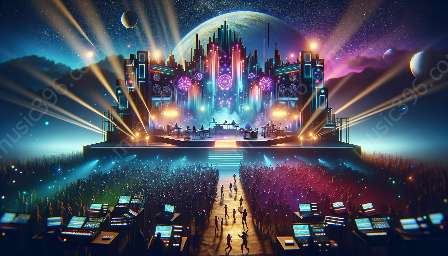Electronic music has become increasingly popular in the music industry, with live performances being a major source of income for DJs and electronic music producers. However, the intersection of copyright laws and live electronic music performances raises several important considerations.
Differences in Copyright Laws for Live Electronic Music Performances
Copyright laws are designed to protect the rights of creators and ensure that they are fairly compensated for their work. When it comes to live electronic music performances, there are several key differences compared to traditional musical performances.
1. Composition vs. Sound Recording
One of the fundamental distinctions in copyright law is between the musical composition and the sound recording. The composition refers to the underlying musical notes and lyrics, while the sound recording is the specific recorded performance of the song. In the context of electronic music, where live performances often involve manipulating pre-recorded tracks and samples, it is crucial to understand the rights and obligations associated with both the composition and the sound recording.
2. Sampling and Clearance
Electronic music frequently involves sampling, where artists incorporate snippets of existing recordings into their own compositions. Copyright laws require that performers and producers obtain clearance for any samples they use, ensuring that the original creators are appropriately acknowledged and compensated. The complex nature of electronic music, with its heavy reliance on sampling, requires a thorough understanding of the clearance process to avoid legal issues.
3. Performance Rights Organizations
Performance rights organizations (PROs) play a crucial role in collecting and distributing royalties for musical performances. However, the way electronic music is created and performed may present unique challenges for PROs in tracking and monetizing live performances. The intricacies of electronic music production and performance call for specialized methods of tracking and reporting to ensure that all parties receive fair compensation.
Understanding the Rights and Obligations
Electronic music performers and producers must be aware of their rights and obligations under copyright law to avoid potential legal disputes and ensure that they are properly rewarded for their creative efforts.
1. Copyright Ownership
It is important for electronic music creators to clearly establish ownership of their compositions and sound recordings. This may involve entering into agreements with collaborators and properly documenting the contributions of each party to avoid future disputes over rights and royalties.
2. Licensing and Royalties
Obtaining the appropriate licenses for the use of copyrighted material is essential for electronic music performers and producers. They must also consider the payment of royalties to the original creators, particularly when utilizing samples or remixing existing works.
3. Digital Distribution and Streaming
In the digital age, electronic music is often distributed and streamed online, raising further copyright considerations. Understanding the implications of digital distribution platforms, such as streaming services and online stores, is crucial for electronic music professionals to protect their intellectual property and maximize their earnings.
The Future of Copyright Laws in Electronic Music
As technology continues to evolve and reshape the music industry, copyright laws will also need to adapt to the changing landscape of electronic music. Legal frameworks and enforcement mechanisms must keep pace with developments in electronic music production and performance to ensure fair treatment for all parties involved.
1. Emerging Technologies
The use of emerging technologies, such as artificial intelligence and machine learning, in electronic music creation introduces new legal challenges related to copyright ownership and infringement. As these technologies become more prevalent, lawmakers and industry stakeholders will need to address the implications for copyright laws and enforcement.
2. Global Collaboration and Licensing
Electronic music often involves collaboration between artists and producers from around the world. This global nature of the industry requires a nuanced understanding of international copyright laws and licensing practices to facilitate seamless collaboration while respecting the rights of creators from different jurisdictions.
3. Advocacy and Education
Advocacy and education are essential components of shaping the future of copyright laws in electronic music. Industry organizations, legal experts, and educational institutions play a vital role in promoting awareness of copyright issues and advocating for fair and equitable treatment of electronic music creators and performers.
Conclusion
Live electronic music performances present unique challenges and opportunities within the framework of copyright laws. By understanding the differences in copyright protection for electronic music, as well as their rights and obligations, performers and producers can navigate the complex legal landscape while continuing to innovate and contribute to the vibrant electronic music scene.


